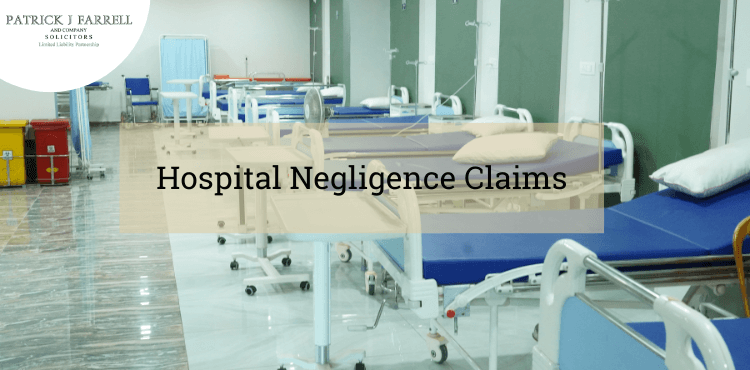Hospital Negligence


Hospital negligence, is a specific form of medical negligence, that occurs when substandard medical care or treatment within a hospital setting leads to patient harm. In Ireland, patients place a huge amount of trust in hospitals to deliver high-quality care; however, if and when this trust is breached, or when standards fall short, the consequences can be severe for patients and their families.
In the guide below, we aim to help you understand the complexities of hospital negligence claims by providing information on how to identify hospital or clinical negligence, understand the common types of negligence and associated consequences, and outline the steps involved in making a claim.

Helen Coughlan is a partner and advises on medical negligence*, family law and personal injuries*. Helen is a qualified family mediator and collaborative law practitioner and is Chairperson of the Family and Child Law Committee of the Law Society.
Hospital negligence occurs when the care provided by a hospital, either through its medical staff or practices, falls well below the accepted standard and causes injury or worsening the condition of a patient.
Hospital negligence can include errors made by medical professionals, including doctors, nurses, and other healthcare staff, as well as failures in hospital policies and procedures. Typically, most cases of hospital negligence occur in the Accident & Emergency (A&E) department of the hospital.
Incidents of Hospital negligence can vary, but often include:
The impact of hospital negligence can be profound, affecting patients physically, emotionally, and financially. Consequences may include:
Several factors can contribute to hospital negligence, such as:
The first step in pursuing a negligence claim against a hospital is to consult with an experienced solicitor. Medical negligence law is a complex and specific field of law, and it’s recommended you consult a specialised solicitor who can provide you with advice on your specific situation.
They will be able to determine the merits of your case, advise whether you are eligible and on the likelihood of success, and then guide you through the process.
At Patrick J Farrell Solicitors, we specialise in medical negligence, don’t hesitate to contact us if you feel you have been a victim of hospital negligence.
Your solicitor will request your medical records, all correspondence with the hospital, and any other supporting documentation you can provide. This evidence is crucial for establishing and supporting your claim of negligence against the hospital.
It may be necessary to have an independent medical expert evaluate your case to establish whether the care you received constituted negligence, and the impact on your health.
Once your solicitor has gathered all necessary evidence, they will draft a Letter of Claim and notify the hospital of your claim against them. Your Letter of Claim outlines the alleged cause of negligence, and the resulting harm or injury sustained.
The hospital, through their own legal team, will respond to the Letter of Claim. They may accept responsibility and offer a settlement; or they may dispute the claim which will lead to further legal proceedings.
Many claims are settled out of court. Your solicitor will negotiate on your behalf to the best possible outcome and a fair compensation for any injuries, financial losses incurred, and any future care you may need. If a settlement cannot be reached, your case can proceed to court where your solicitor will prepare for and represent you in proceedings.
Hospital negligence claims can be challenging both legally and emotionally. However, armed with the right information, support, and legal guidance, affected individuals and their families can successfully seek the justice and compensation they rightfully deserve.
If you believe you or a loved one has suffered due to hospital negligence, it’s crucial to seek expert legal advice. At PJF, our expert team can provide compassionate advice and expert legal guidance to ensure you get the best possible outcome. If you feel you’ve been affected, don’t hesitate to contact us.
At Patrick J Farrell & Company Solicitors, we understand the profound impact medical negligence can have on your life. With a legacy founded by Patrick J. Farrell and carried forward by a dedicated team, we have been advocates for justice for over four decades. Our commitment to putting our clients’ interests first, combined with our extensive legal expertise, makes us the ideal partners in your pursuit of justice.
From the moment you walk through our doors to the resolution of your case, you’ll be treated with the utmost courtesy, respect, and understanding. Choose us – where your well-being is our top priority. Reach out to us today and let our experienced solicitors guide you every step of the way.
Delayed Diagnosis ClaimsHow To Make a Medical Negligence Claim
Making a Medical Negligence Claim
Birth Injury Claims: Guide to Concerns and Compensation
Will Irish healthcare issues cause an increase in medical negligence claims?
Plastic Surgery and Cosmetic Procedures
Hip replacements and joint replacements
Understanding Healthcare-Associated Infection (HAI) Claims
Hip replacements and joint replacements